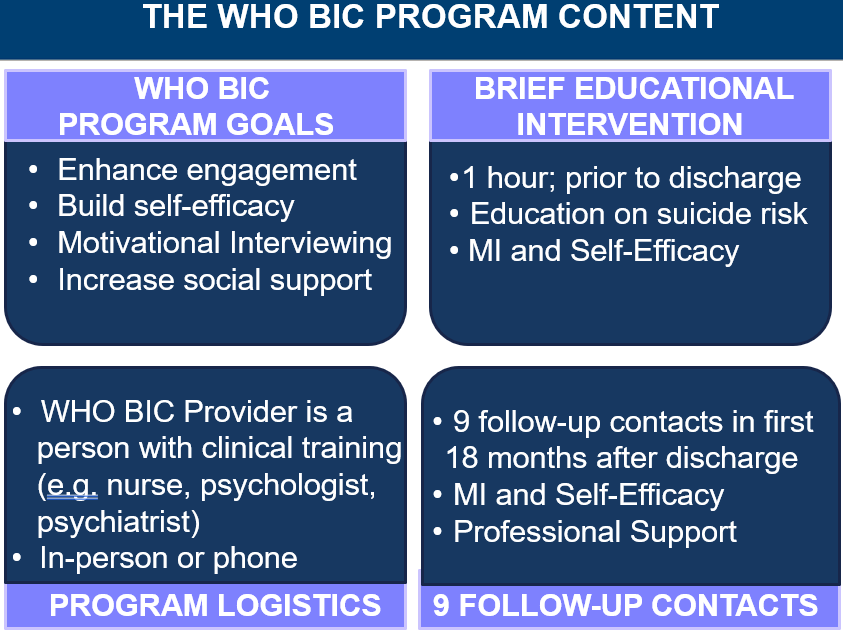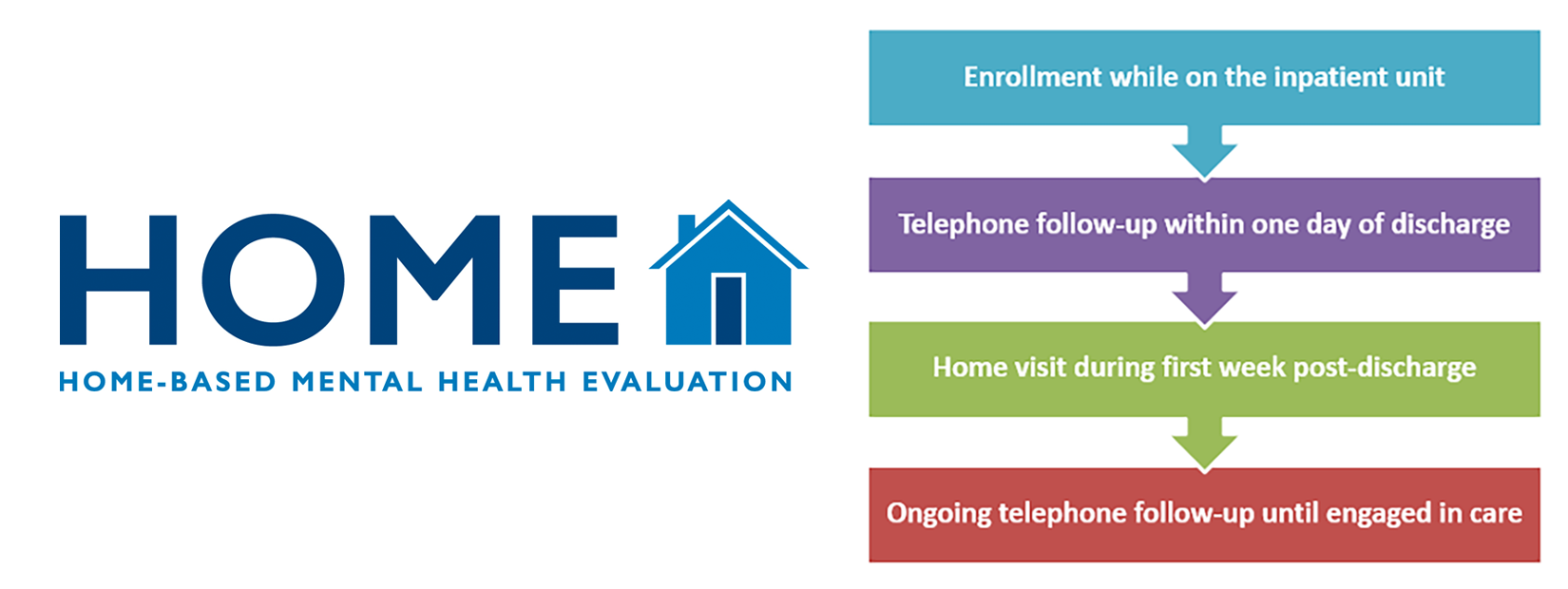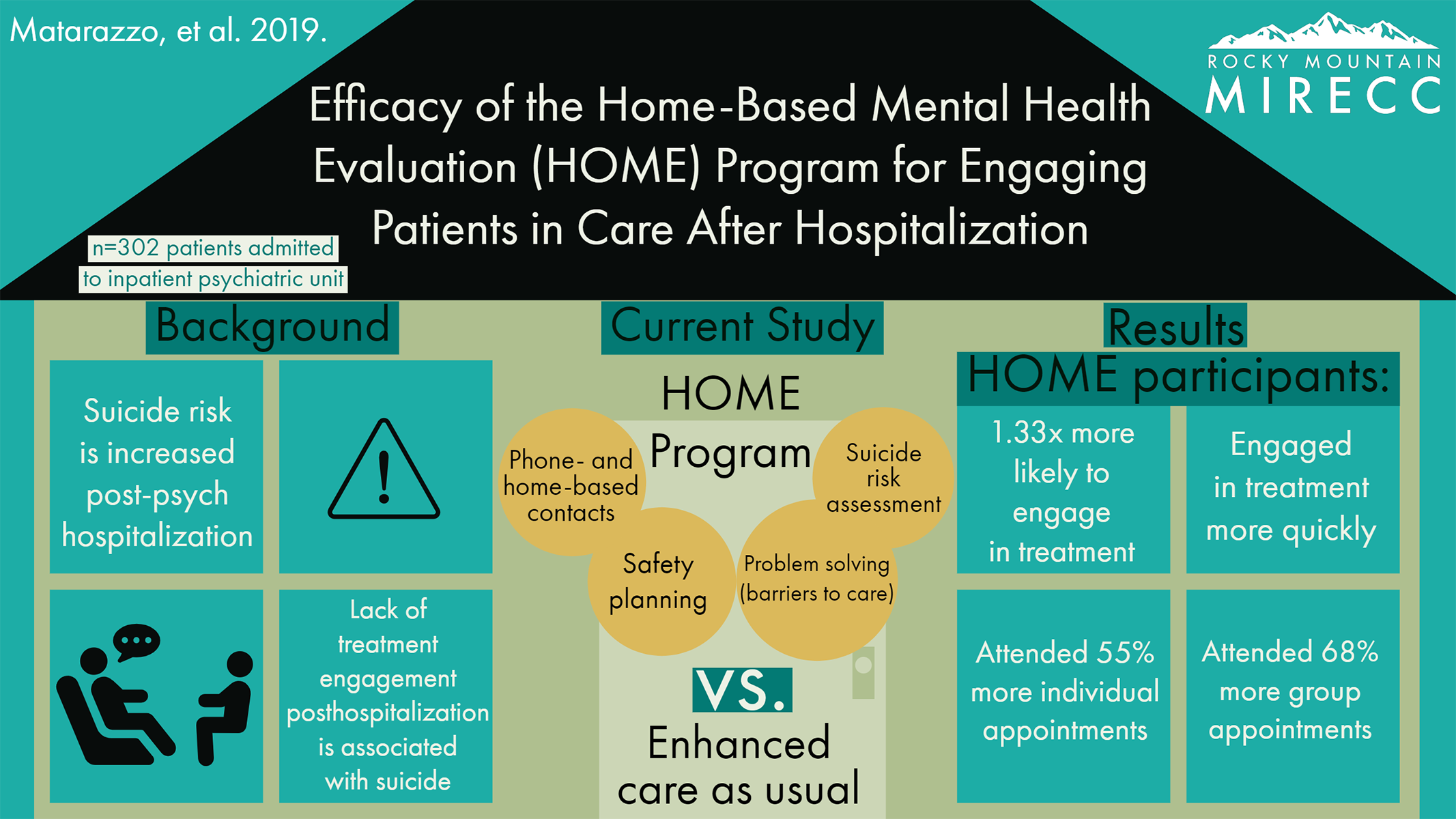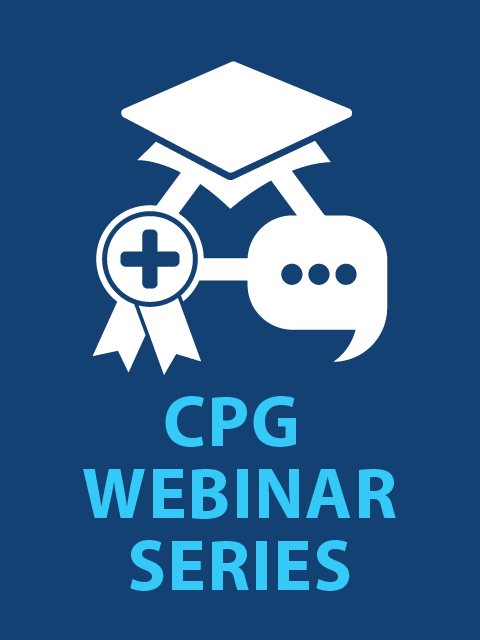17: Brief Contact Interventions
Risk Management and Treatment » Post-acute Care
17: Brief Contact Interventions
There is insufficient evidence to recommend for or against offering brief contact interventions (e.g., telephonic interventions, crisis cards, World Health Organization Brief Intervention and Contact treatment modality) in addition to usual care following discharge from the emergency department to reduce the risk of suicide attempts.
Strength:
Neither for nor against
Category:
ReviewedNew-replaced
Grades and Definitions
- Strong for
- or "We recommend offering this option …"
- Weak for
- or "We suggest offering this option …"
- No recommendation
- or "There is insufficient evidence …"
- Weak against
- or "We suggest not offering this option …"
- Strong against
- or "We recommend against offering this option …"
Categories and Definitions |
||
|---|---|---|
| Evidence Reviewed* | Recommendation Category* | Definition* |
| Reviewed | New-added | New recommendation following review of the evidence |
| New-replaced | Recommendation from previous CPG that has been carried over to the updated CPG that has been changed following review of the evidence | |
| Not changed | Recommendation from previous CPG that has been carried forward to the updated CPG where the evidence has been reviewed but the recommendation is not changed | |
| Amended | Recommendation from the previous CPG that has been carried forward to the updated CPG where the evidence has been reviewed and a minor amendment has been made | |
| Deleted | Recommendation from the previous CPG that has been removed based on review of the evidence | |
| Not reviewed | Not changed | Recommendation from previous CPG that has been carried forward to the updated CPG, but for which the evidence has not been reviewed |
| Amended | Recommendation from the previous CPG that has been carried forward to the updated CPG where the evidence has not been reviewed and a minor amendment has been made | |
| Deleted | Recommendation from the previous CPG that has been removed because it was deemed out of scope for the updated CPG | |
| *Adapted from the NICE guideline manual (2012): The guidelines manual. London: National Institute for Health and Care Excellence;2012. and Martinez Garcia L, McFarlane E, Barnes S, Sanabria AJ, Alonso-Coello P, Alderson P. Updated recommendations: An assessment of NICE clinical guidelines. Implement Sci. 2014;9:72. | ||
Recommendation Resources
Following discharge from acute services (e.g., emergency department [ED], inpatient), brief contact interventions are sometimes offered to patients. These interventions may involve psychoeducation, ongoing suicide risk assessment, safety planning, and treatment engagement support. The World Health Organization Brief Intervention and Contact (WHO BIC) treatment is one such intervention. It involves brief contacts during the high-risk time following an ED visit for a suicide attempt. The goals are to enhance treatment engagement, build self-efficacy and increase social support.
Training and Clinical Resources
This section includes recommended trainings and/or clinical resources about brief contact interventions.
- WHO-BIC
-
Click/Tap for smaller image

(Acknowledgement: Dr. Natalie Riblet) -
The WHO BIC Program Content
WHO BIC Program Goals
- Enhance engagement
- Build self-efficacy
- Motivational Interviewing
- Increase social supporting
Brief Educational Intervention
- 1 hour; prior to discharge
- Education on suicide risk
- MI and Self-efficacy
Program Logistics
- WHO BIC Provider is a person with clinical training (e.g.nurse, psychologist, psychiatrist)
- In-person or phone
9 Follow-up Contacts
- 9 follow-up contacts in first 18 months after discharge
- MI and Self-efficacy
- Professional Support
-
- The WHO BIC intervention starts with an individual educational session as close to the time of ED discharge as possible. Afterwards, nine follow up contacts are conducted over eighteen months.
- Sessions can be offered in person or by telephone by a variety of professionally trained mental health providers (psychiatrist, psychologist, nurse, social worker).
- Home-Based Mental Health Evaluation (HOME) Program
-
Click/Tap for smaller image

Overview of the HOME Program -
HOME
Home-based Mental Health Evaluation
- Enrollment while on the inpatient unit
- Telephone follow-up within one day of discharge
- Home visit during first week post-discharge
- Ongoing telephone follow-up until engaged in care
- Each post-discharge contact includes:
-
- Suicide risk assessment
- Review and update of Safety Plan
- Appointment reminders
- Identify and problem-solve around barriers to care
Veterans who participated in the HOME Program were more likely to engage in care, engaged in care more quickly, and attended more individual outpatient appointments in the 90 days post-discharge (Matarazzo et al., 2019).
-
Click/Tap for smaller image

Efficacy of the Home-Based Mental Health Evaluation (HOME) Prgram for Engaging Patients in Care After Hospitalization (Matarazzo, et al 2019, Rocky Mountain MIRECC) -
Efficacy of the Home-Based Mental Health Evaluation (HOME) Prgram for Engaging Patients in Care After Hospitalization (Matarazzo, et al 2019, Rocky Mountain MIRECC)
(n=302 patients admitted to inpatient psyciatric unit)
Background:
- Suicide risk is increased post-psyc hospitalization
- Lack of treatment engagement posthospitalization is associated with suicide
Current Study:
Home Program
- Phone- and home-based contacts
- Safety planning
- Problem solving (barriers to care)
- Suicide risk assessment
vs. Enhanced care as usual
Results:
HOME participants
- 1.33x more likely to engage in Treatment
- Engaged in treatment more quickly
- Attended 55% more individual appointments
- Attended 68% more group appointments
- If you are interested in the HOME Program Manual or training, please email srmconsult@va.gov.
Books
This section includes recommended books about offering brief contact interventions.
- , Oxford Textbook of Suicidology and Suicide Prevention, 2 end, Oxford Textbooks in Psychiatry (Oxford, 2021; online edn, Oxford Academic, 1 Jan. 2021).
Webinars
This section includes recommended webinars about brief contact interventions.
-
 WHO-BIC as a Strategy to Prevent Suicide Presented by Dr. Natalie Riblet
WHO-BIC as a Strategy to Prevent Suicide Presented by Dr. Natalie Riblet -
 Home Visits as a Suicide Prevention Strategy Presented by Dr. Bridget Matarazzo
Home Visits as a Suicide Prevention Strategy Presented by Dr. Bridget Matarazzo
Articles
This section includes recommended articles about brief contact interventions.
- (2008). Effectiveness of brief intervention and contact for suicide attempters: a randomized controlled trial in five countries. Bulletin of the World Health Organization, 86(9). 703–709. https://doi.org/10.2471/blt.07.046995
- (2019). Efficacy of the Home-Based Mental Health Evaluation (HOME) Program for Engaging Patients in Care After Hospitalization. Psychiatric services (Washington, D.C.). 70(12), 1094-1100. https://doi.org/10.1176/appi.ps.201900002
- (2014). The efficacy of telephonic follow up in prevention of suicidal reattempt in patients with suicide attempt history. Advanced biomedical research, 3. 198. https://doi.org/10.4103/2277-9175.142043
- (2022). A virtual, pilot randomized trial of a brief intervention to prevent suicide in an integrated healthcare setting. General hospital psychiatry, 75. 68–74. https://doi.org/10.1016/j.genhosppsych.2022.02.002
- (2019). A Pilot Study of an Intervention to Prevent Suicide After Psychiatric Hospitalization. The Journal of nervous and mental disease, 207(12). 1031-1038. https://doi.org/10.1097/NMD.0000000000001061
- (2019). Exploring Psychiatric Inpatients' Beliefs About the Role of Post-discharge Follow-up Care in Suicide Prevention. Military medicine, 184(1-2). e91-e100. https://doi.org/10.1093/milmed/usy129
- (2021). A Pilot Randomized Trial of a Brief Intervention to Prevent Suicide After Inpatient Psychiatric Discharge. Psychiatric services (Washington, D.C.), appips202000537. Advance online publication. https://doi.org/10.1176/appi.ps.202000537




















